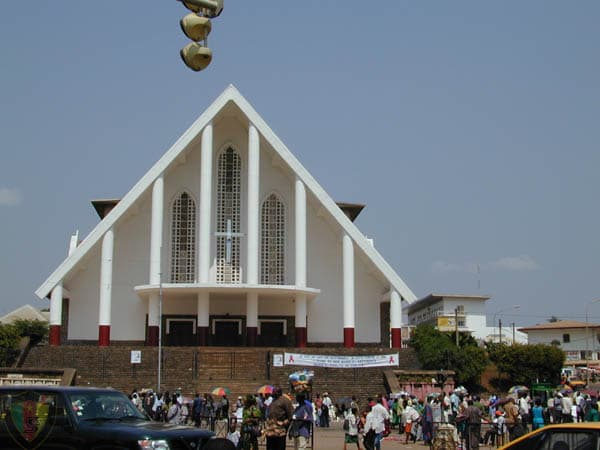YAOUNDÉ, Cameroon – Preparations are underway for the celebration of Cameroon’s National Day on May 20.
President Paul Biya, in power now for 42 years and eyeing another Presidential bid next year has consistently talked up the idea that “Cameroon is one and indivisible.”
That indivisibility is symbolized by the May 20 celebration – the day Cameroon voted in a controversial referendum to dissolve the two-state federal system in favor of a unitary state.
The unity the celebrations symbolize is however increasingly questioned. English-speaking dissenters are making more noise challenging the narrative of a harmonious Cameroon.
In a “Mass for the Nation,” Archbishop Jean Mbarga of Yaoundé warned against division, saying that “our nation has a particular need for peace.”
“Now is not the time for disorder, revolt or incitement to violence,” the archbishop said during the May 12 Mass at the Mary Queen of the Apostles Basilica in Mvolye, Yaoundé.
“We need maturity; we need to seek a higher good, beyond our personal interests. It is this higher good that comes to us from God,’ Mbarga told congregants.
“Continue each one at his or her own level, to implore God’s will, so that he inspires all Cameroonians with words, gestures and actions that build up and not destroy. That value and not humiliate. That makes us grow, not retrogress,’ he added.
In comments to Crux shortly after the Mass, the archbishop spoke about the Presidential election that will take place next year, and called on Cameroonians to pray that the poll takes place in a peaceful atmosphere.
“We have therefore offered all this to God so that these events, which will take place in the days to come, will take place in peace and maturity, in brotherhood, so that the common good is superior to personal good, to particular interests,” Mbarga said.
The archbishop’s call comes amid escalating violence in the country’s English-speaking North West and South West regions.
Five Cameroonian security forces, including the Eyummodjock Brigade Commander [in the South West] were killed in an attack by members of the Ambazonia Defense Forces (ADF) the same weekend the prelate celebrated the ‘Mass for the Nation.”
Security forces said separatists also raided a primary school in Ndu in the country’s North West region on Tuesday May 14, and abducted two teachers.
Separatists in Cameroon’s two English-speaking regions have been fighting to secede from the rest of the country and create a new nation to be called Ambazonia.
It all started in 2016 when teachers and Lawyers in the two English-speaking regions took to the streets to protest against what they claimed was the ‘Francophonization’ of the Common Law and British-based education systems practiced in the two regions.
The government took a hardline, and what was initially a peaceful strike mutated into a political crisis. A separatist wing ensued and took up arms, demanding independence for Cameroon’s English speakers.
By 2022, the conflict had claimed the lives of at least 6,000 people and forced hundreds of thousands from their homes, according to the International Crisis Group. More than 70,000 others had sought refuge in Nigeria. The figures are definitely higher now.
But what happened in 2016 was the culmination of decades of what the country’s English speakers have always said were attempts by the French-speaking majority to marginalize and assimilate them.
Once a German colony, Cameroon was split between the victorious powers when Germany was defeated in the First World War. France got 80 percent of the territory and Britain got 20 percent. The two sides were thus administered separately until 1961 when the British Southern Cameroons voted in an UN-organized plebiscite to obtain independence by joining the French speaking part of the country that had already gotten its independence from France.
The two parties agreed on a federation of two co-equal states. But a controversial referendum in 1972 dismantled the federal structure, and English speakers have complained that the centralization of power was meant to foster an agenda of their assimilation.
The leader of the separatist movement, Sesseku Ayuk Tabe who is serving life in jail – along with nine other leaders – at the Kondengui Maximum Security Prison in Yaoundé told Crux that his incarceration won’t hold back the fight for independence.
“We are here because Cameroon wrongfully thinks that the unquenchable spirit of self-determination and self-realization of the people of Ambazonia can be silenced by violence,” he said.
The Cameroon government has dismissed the idea that Anglophones in Cameroon are being marginalized and far removed from the centers of power.
“The supposed feeling of marginalization by the people of the North-West and South-West Regions has often been advanced to justify this crisis. On this score, I wish to remind our compatriots in these regions, but also to those in the other eight regions of Cameroon, that marginalization, exclusion or stigmatization have never guided the work of the various governments I have formed since I became president of our country,” Biya said in an address to the nation on September 10, 2019.
The President insisted that “the corporate demands” by Anglophone lawyers and teachers have been exploited and distorted by “radical movements, mainly inspired from abroad.”
“They have thus hatched a secessionist plan to partition our country. In this regard, they have formed and financed armed groups that have caused untold harm to the population of the North-West and South-West Regions.”
The president has continued to call on separatists to drop their arms and join the National Disarmament, Demobilization and Reintegration centers, but has insisted that Cameroon will remain a “one and indivisible country.”
For the President of the Cameroon Episcopal Conference, Archbishop Andrew Nkea Fuanya of Bamenda, a return to peace has become an issue of utmost importance.
“I stand for reconciliation and peace among the people,” he told Crux last month.














